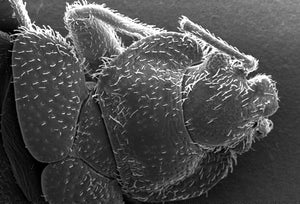Thick Skin Protects Bed Bugs
New Study Shows Bed Bugs Evolving Thicker Skin
We’ve been writing about bed bugs increasing resistance to pesticides since ZappBug was founded, and this week yet another study has been released showing one way that they’re evolving to survive chemical treatments. By comparing populations of pesticide resistant bed bugs with those who are still susceptible David Lilly, at the University of Sydney, determined that the resistant groups are literally thicker-skinned.

Close-up of Bed Bug Exoskeleton
In his research Lilly tested the resistance of bed bugs against a pyrethroid based insecticide – a class of chemicals that bed bugs have been increasingly resistant against for years. He found that the bed bugs with a thicker cuticle (the exoskeleton of the bug) were much more able to survive the pesticide. Because the skin is thicker, it takes longer for the pyrethroids to penetrate the exoskeleton, which in turn allows the bug more time to mobilize it’s internal defenses such as enzymes that directly target pyrethroids.
Bed bugs also fight pyrethroids through mutations in their sodium channels. Other studies have shown that resistant populations have mutated to block the chemicals from binding where they are designed to target the bugs, allowing them to survive unharmed. Likewise, they are also evolving to product more and better enzymes that bed bugs uses to fight pyrethroids. This continual ability of bed bugs to evolve resistance to conventional chemical treatment is worrying enough that even The Onion has taken notice.
This new research leaves several questions that will hopefully be investigated soon. Does the thicker chitin allow bed bugs to survive more than just pyrethroids based pesticides? How much thicker are the bed bug chitins becoming? More research will be required, but for now Lilly suggests relying on methods like heat treatment over chemical approaches to managing bed bugs.


